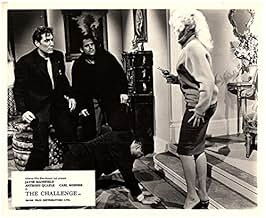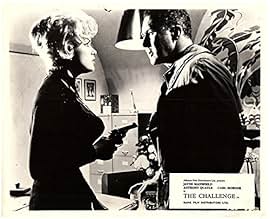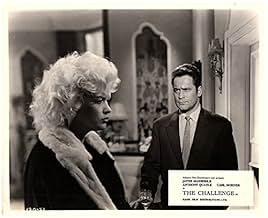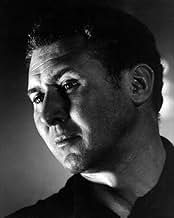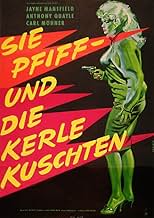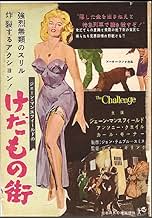Ajouter une intrigue dans votre langueA gang leader dumps her criminal boyfriend when he is convicted of robbery, but he recovers the stolen loot once he's released. In retaliation, the gang kidnaps his son and demands the money... Tout lireA gang leader dumps her criminal boyfriend when he is convicted of robbery, but he recovers the stolen loot once he's released. In retaliation, the gang kidnaps his son and demands the money as ransom.A gang leader dumps her criminal boyfriend when he is convicted of robbery, but he recovers the stolen loot once he's released. In retaliation, the gang kidnaps his son and demands the money as ransom.
- Réalisation
- Scénario
- Casting principal
Avis à la une
We often forget that director John Gilling was not only a horror film specialist, but also a crime and adventure yarns provider. This one THE CHALLENGE, PICK UP ALLEY, THE MAN INSIDE, TIGER BY THE TAIL...and I don't even speak of his first thrillers, are the best proof. This one shows Anthony Quayle, for once, in a lead character, and Carl Möhnner in a supporting one, seven years after RIFIFI. And in RIFIFI, Carl Möhner's son was kidnapped, and a jewels' ransom was asked against the child's release. Here Carl Moehner's character kidnaps a little boy, for the same purpose !!! The total contrary... Beware, this film is not as gritty nor terrific as the Jules Dassin's movie, far far tougher. But it remains a pretty good British crime actioner, in a period where UK film industry still made good stuff, unlike now, in 2024, where most of the crime and gangster movies are made for straight to DVD or streaming platforms market.
The setup for "It Takes A Thief" really doesn't make a lot of sense--and that is a huge problem. It begins with Jim (Anthony Quayle) falling for Billy (Jayne Mansfield). He doesn't realize that Billy is a cold and calculating sort--and she is setting him up. She convinces him to join in on a heist and he agrees. Now here is the part that makes no sense at all--Jim is responsible for hiding the money and then someone in the gang lets the cops know he was in on the crime and he's sent to prison. Why turn Jim in to the police? Jim would either return the money to the authorities OR he'd sit on it until after he's out of prison--and that could be years. It simply makes little sense. And for some time you aren't sure if Billy did this or perhaps Kristy--the brooding gang member who appears to have an extremely close relationship with Billy.
Regardless, several years pass and Jim has now done his time--and the money is still hidden. He has no intention of returning to his life of crime--even though the old gang is pressuring him to do so because they want the loot. When he refuses to cooperate with them, the gang turns up the pressure by kidnapping Jim's son. At the same time, the police are keeping an eye on Jim because they, too, want the money as well. With all this pressure on him, what is he to do?
Aside from a main plot idea that makes little sense, "It Takes a Thief" has several other things working against it. The big one is the odd casting of Mansfield considering the film is set in England. Plus, the pairing of the distinguished actor, Anthony Quayle with Jayne Mansfield is just plain weird. Finally, the DVD print is pretty bad--making the viewing experience less than stellar. It's really sad because apart from the weird casting strange plot about Jim being turned it, it's a very good noir sort of film. The film has a lot of tension and the scenes involving the search for the kid late in the film were awfully good.
Regardless, several years pass and Jim has now done his time--and the money is still hidden. He has no intention of returning to his life of crime--even though the old gang is pressuring him to do so because they want the loot. When he refuses to cooperate with them, the gang turns up the pressure by kidnapping Jim's son. At the same time, the police are keeping an eye on Jim because they, too, want the money as well. With all this pressure on him, what is he to do?
Aside from a main plot idea that makes little sense, "It Takes a Thief" has several other things working against it. The big one is the odd casting of Mansfield considering the film is set in England. Plus, the pairing of the distinguished actor, Anthony Quayle with Jayne Mansfield is just plain weird. Finally, the DVD print is pretty bad--making the viewing experience less than stellar. It's really sad because apart from the weird casting strange plot about Jim being turned it, it's a very good noir sort of film. The film has a lot of tension and the scenes involving the search for the kid late in the film were awfully good.
It is sometimes said that the age of film noir was over by the end of the fifties; Orson Welles's "Touch of Evil" from 1958 is sometimes regarded as marking the end of the line. This may be true of America, the genre's original home, but in Britain noir survived into the sixties. This may be because we were slower than America to adopt colour television, meaning that there was still a market for black-and-white films here. "The Challenge" from 1960 is an example of later British noir. (In America it was shown as "It Takes a Thief", but I will use the original British title).
Jim Maxton, a lorry driver and petty criminal, is persuaded by his gang leader lover Billy to take part in a big robbery. (And no, this isn't a rare example of a film from the early sixties with a gay theme. Although the cast-list spells her name as "Billy" rather than "Billie", she is a woman). He is betrayed to the police, arrested, convicted and sentenced to eight years in jail, of which he serves five, while the rest of the gang remain at liberty. Upon release, Maxton tries to go straight and resumes his career as a lorry driver, but it turns out that he is the only one of the gang who knows where the loot from the robbery is buried. In an attempt to force him to reveal its whereabouts, his former partners in crime kidnap his young son Joey and threaten the boy's life.
Contrary to what one reviewer states, Jayne Mansfield was not a starlet at the start of her career when she made this film. Her career as a Hollywood leading lady was a relatively short one, largely because she was seen as a sort of poor man's Marilyn Monroe. She was not without acting talent, but producers preferred to cast her in undemanding roles in light comedies which showcased her voluptuous figure. (Something similar happened with Diana Dors in Britain). By 1960 her popularity in America was waning, and she tried to reinvent herself in Europe. This was her only British film, but she was also to appear in Italian, German and Greek ones.
Mansfield is not particularly convincing as a female London gang boss, especially as her accent seems stuck halfway across the Atlantic, and we are never sure whether Billy is supposed to be completely ruthless or whether she is partly redeemed by a softer side to her nature. There are better performances from the actors playing two other members of the gang, Carl Möhner as Kristy and Peter Reynolds as Buddy. Kristy, who definitely has no softer side to his nature, is Maxton's rival for Billy's affections and probably the man who informed on Maxton to the police. As for Buddy he is not so much ruthless as psychopathic; he has responsibility for guarding the kidnapped Joey and devises a sadistic scheme to bring about the boy's death and make it look like an accident.
The best acting, however, comes from Anthony Quayle as Maxton. Quayle was a leading light in the British theatre, both as actor and director, but never had quite the same success in the cinema, possibly because (unlike, say, Olivier or Burton) he never really had the looks to be a matinee idol. Most of his films were British- he never attempted to conquer Hollywood- and he mostly appeared in supporting roles. In "The Challenge", however, he had a chance to play a leading role, and made the most of it. His Maxton, despite his criminal past, is a man with a certain decency, far more so than the other members of his gang, and the nearest thing the film has to a hero. In some ways the film is a standard crime thriller, but Quayle's performance, together with a well-written script and a suspenseful ending, is the main reason why it deserves an above-average mark. 6/10.
Jim Maxton, a lorry driver and petty criminal, is persuaded by his gang leader lover Billy to take part in a big robbery. (And no, this isn't a rare example of a film from the early sixties with a gay theme. Although the cast-list spells her name as "Billy" rather than "Billie", she is a woman). He is betrayed to the police, arrested, convicted and sentenced to eight years in jail, of which he serves five, while the rest of the gang remain at liberty. Upon release, Maxton tries to go straight and resumes his career as a lorry driver, but it turns out that he is the only one of the gang who knows where the loot from the robbery is buried. In an attempt to force him to reveal its whereabouts, his former partners in crime kidnap his young son Joey and threaten the boy's life.
Contrary to what one reviewer states, Jayne Mansfield was not a starlet at the start of her career when she made this film. Her career as a Hollywood leading lady was a relatively short one, largely because she was seen as a sort of poor man's Marilyn Monroe. She was not without acting talent, but producers preferred to cast her in undemanding roles in light comedies which showcased her voluptuous figure. (Something similar happened with Diana Dors in Britain). By 1960 her popularity in America was waning, and she tried to reinvent herself in Europe. This was her only British film, but she was also to appear in Italian, German and Greek ones.
Mansfield is not particularly convincing as a female London gang boss, especially as her accent seems stuck halfway across the Atlantic, and we are never sure whether Billy is supposed to be completely ruthless or whether she is partly redeemed by a softer side to her nature. There are better performances from the actors playing two other members of the gang, Carl Möhner as Kristy and Peter Reynolds as Buddy. Kristy, who definitely has no softer side to his nature, is Maxton's rival for Billy's affections and probably the man who informed on Maxton to the police. As for Buddy he is not so much ruthless as psychopathic; he has responsibility for guarding the kidnapped Joey and devises a sadistic scheme to bring about the boy's death and make it look like an accident.
The best acting, however, comes from Anthony Quayle as Maxton. Quayle was a leading light in the British theatre, both as actor and director, but never had quite the same success in the cinema, possibly because (unlike, say, Olivier or Burton) he never really had the looks to be a matinee idol. Most of his films were British- he never attempted to conquer Hollywood- and he mostly appeared in supporting roles. In "The Challenge", however, he had a chance to play a leading role, and made the most of it. His Maxton, despite his criminal past, is a man with a certain decency, far more so than the other members of his gang, and the nearest thing the film has to a hero. In some ways the film is a standard crime thriller, but Quayle's performance, together with a well-written script and a suspenseful ending, is the main reason why it deserves an above-average mark. 6/10.
Aka..."The Challenge"
Exceptional Psychological and Physical Violence Permeate this Picture from Britain.
Cutting-Edge Presentation of Child in Peril, Violence to Women, and Abnormal Psychology Wrap Around a Good Jayne Mansfield Performance.
The Film also Offers Thrills Filmed with Dutch Angles and Tight-Tension Scenarios with Nail-Biting Brutality and High-Speed Chases.
Anthony Quayle Gives a Solid, Grim Outing as a Gang-Member who Does Time and is Released only to Find His Gang Turns on Him for the "Buried Treasure".
They Not Only Turn on Him but His 6 Year Old Son and His Aging Mom.
The Film Contains some of the Most Gut-Wrenching Violence Seen on the Screen Before the Code Broke Down.
It's a Fantastic Gang-Land Crime Thriller that is Virtually Unknown and Deserves more Attention and Praise.
Jayne, Quayle, and Director Gillian Made this an Atypical "Times-are-Changing" Introduction, to the Turbulent, Paradigm Shattering Decade.
A Hidden Gem.
Exceptional Psychological and Physical Violence Permeate this Picture from Britain.
Cutting-Edge Presentation of Child in Peril, Violence to Women, and Abnormal Psychology Wrap Around a Good Jayne Mansfield Performance.
The Film also Offers Thrills Filmed with Dutch Angles and Tight-Tension Scenarios with Nail-Biting Brutality and High-Speed Chases.
Anthony Quayle Gives a Solid, Grim Outing as a Gang-Member who Does Time and is Released only to Find His Gang Turns on Him for the "Buried Treasure".
They Not Only Turn on Him but His 6 Year Old Son and His Aging Mom.
The Film Contains some of the Most Gut-Wrenching Violence Seen on the Screen Before the Code Broke Down.
It's a Fantastic Gang-Land Crime Thriller that is Virtually Unknown and Deserves more Attention and Praise.
Jayne, Quayle, and Director Gillian Made this an Atypical "Times-are-Changing" Introduction, to the Turbulent, Paradigm Shattering Decade.
A Hidden Gem.
This film contains a surprisingly high level of violence; in particular the kidnapping scene where the boy's grandmother is beaten up. Even nowadays when gory violence seems to be the norm, it mainly happens to men and I think most film producers would hesitate before depicting a helpless old lady being beaten senseless in prolonged and graphic detail, in this case made more realistic and believable by good acting from Barbara Mullen.
The same thug who beat her is later arrested in his bedroom by the police sending in a dog followed by three heavies who give him a savage beating before driving him to the station where he is threatened with more unless he gives the location of the boy.
Whether her acting is good or bad the producers probably wanted Jayne Mansfield as added glamour which she provides by looking stunning particularly towards the end when she sings in her club.
Overall this is an exciting and entertaining thriller.
Le saviez-vous
- AnecdotesThe train set bought for Joey has the name Rovex on the box. This was a name used by the Triang company which manufactured OO scale model railways. However, the actual train set in the movie appears to be a much larger Hornby O scale set.
- GaffesIt is never explained why the lorry drivers decide to attack Jim and tie him up rather than help him to retrieve the loot.
- ConnexionsFeatured in Neil Sean Meets...: Stars & Friends of Jayne Mansfield (2015)
- Bandes originalesThe Challenge
Lyrics by Robert Halfin
Music by Bill McGuffie (as William McGuffie)
Performed by Jayne Mansfield (dubbed by Joan Small) (uncredited)
Meilleurs choix
Connectez-vous pour évaluer et suivre la liste de favoris afin de recevoir des recommandations personnalisées
- How long is It Takes a Thief?Alimenté par Alexa
Détails
- Date de sortie
- Pays d’origine
- Langue
- Aussi connu sous le nom de
- It Takes a Thief
- Lieux de tournage
- Société de production
- Voir plus de crédits d'entreprise sur IMDbPro
- Durée1 heure 41 minutes
- Couleur
- Rapport de forme
- 1.37 : 1
Contribuer à cette page
Suggérer une modification ou ajouter du contenu manquant

Lacune principale
By what name was Un compte à régler (1960) officially released in India in English?
Répondre
